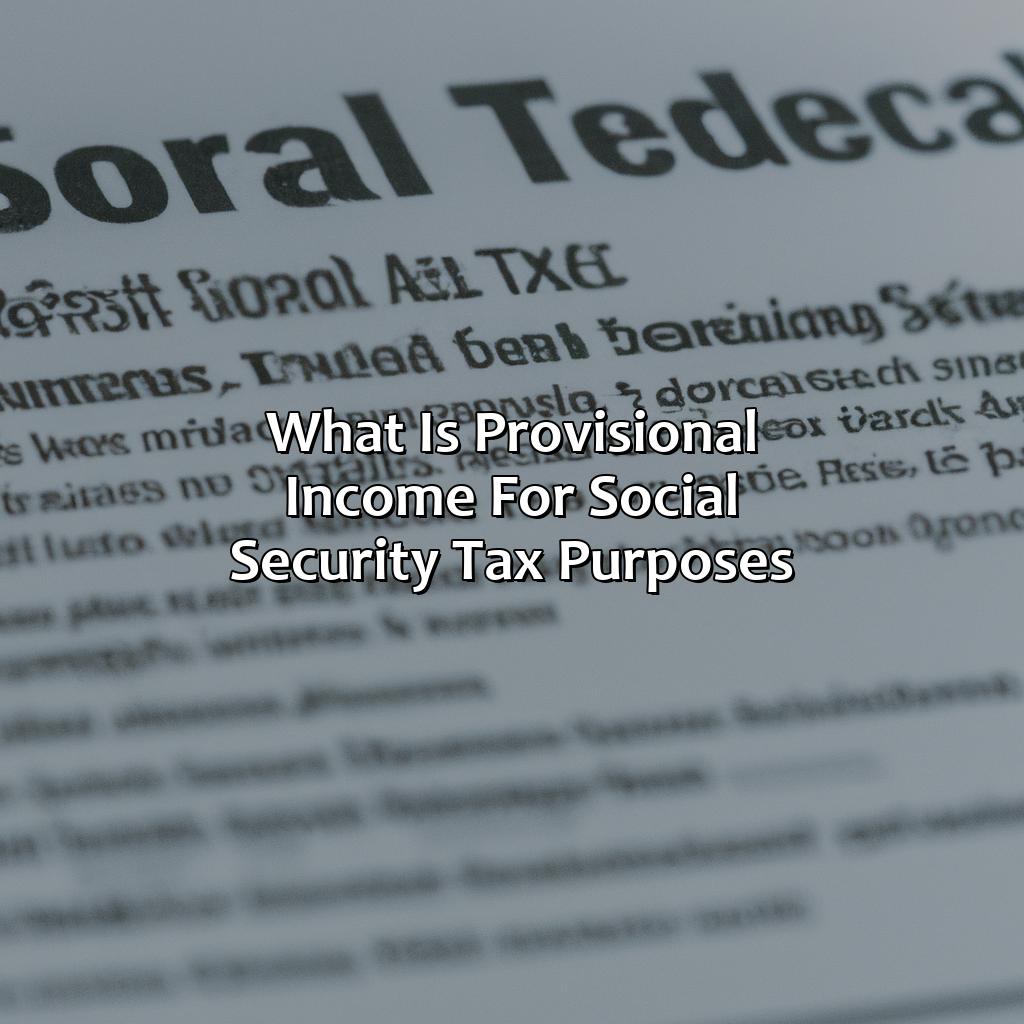What Is Provisional Income For Social Security Tax Purposes?
Key Takeaway:
- Provisional income for social security tax purposes is defined as the sum of one’s adjusted gross income, tax-exempt interest income, and one-half of their social security benefits.
- The calculation of provisional income is necessary to determine whether social security benefits are subject to taxation. If provisional income exceeds a certain threshold, a portion of social security benefits may be taxed.
- To manage provisional income for social security tax purposes, one can consider strategies such as tax-deferred retirement savings, Roth IRA conversions, and strategic timing of income and deductions.
Are you unsure about calculating your provisional income for Social Security taxes? Look no further! This article explores the ins and outs of this important calculation, helping you to stay on top of your tax obligations.
Definition of Provisional Income for Social Security Tax Purposes
Provisional income, regarding Social Security tax purposes, refers to an individual’s annual income that combines half of the Social Security benefits with their total taxable income. This income is used to determine if an individual has to pay taxes on their Social Security benefits.
Moreover, the Internal Revenue Service (IRS) uses provisional income to calculate the taxable portion of Social Security benefits. This amount can be calculated manually or generated automatically when filing taxes. It is important to note that the calculation of provisional income differs for individuals who file their taxes as single or married, jointly.
Additionally, Social Security benefits may be subject to taxes if the provisional income surpasses a specific threshold. For example, if an individual files a tax return as single and their provisional income exceeds $25,000, then they may have to pay taxes on up to 50% of their Social Security benefits.
It is crucial to understand that provisional income is not the same as an individual’s gross income or adjusted gross income. It is a specific calculation used for Social Security tax purposes only.
A true story that highlights the importance of understanding provisional income involves a retired couple who failed to calculate their provisional income correctly. They assumed that their Social Security benefits would not be taxed, but after filing their taxes, they were surprised to learn that they owed a significant amount of taxes on their benefits. They later discovered that their provisional income was above the threshold for their filing status, resulting in a higher tax liability. It is essential to calculate provisional income accurately to avoid any surprises during tax season.
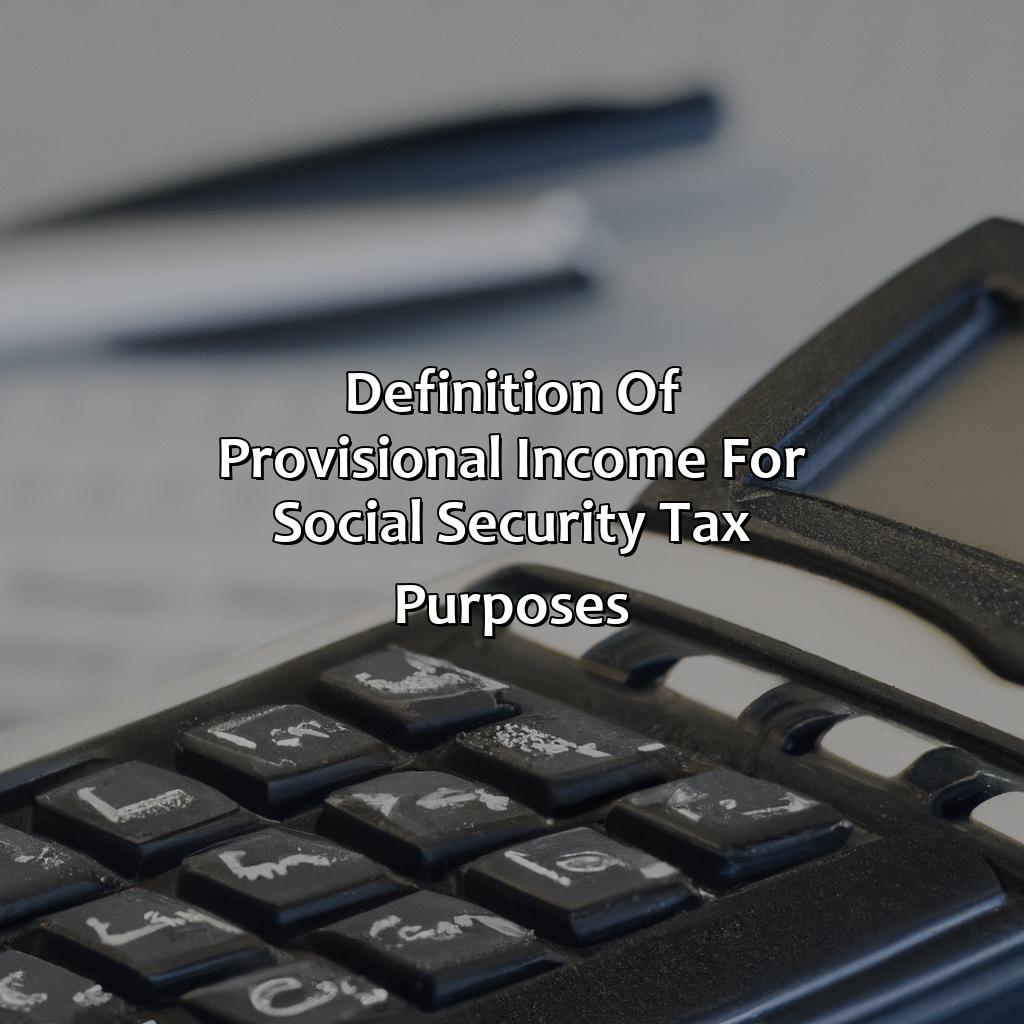
Image credits: retiregenz.com by David Arnold
Calculation of Provisional Income
Provisional Income Calculation Demystified
To calculate your Provisional Income for Social Security Tax purposes, add up your adjusted gross income, tax-free interest income, and 50% of your Social Security benefits. If the total is below the tax threshold, your Social Security income is not taxable.
Here is a breakdown of the Calculation of Provisional Income:
| Adjusted Gross Income | Tax-Free Interest Income | 50% of Social Security Benefits | = Provisional Income |
| $50,000 | $0 | $12,000 | $62,000 |
It is essential to note that retirement account distributions and other taxable income sources can increase your Provisional Income and trigger Social Security taxation.
For a comprehensive Provisional Income Calculation, consult a tax professional to assist you in reviewing your unique financial circumstances.
Ensure you calculate your Provisional Income correctly to avoid missing out on expensed social security benefits.
Don’t wait any longer, review your income sources today!
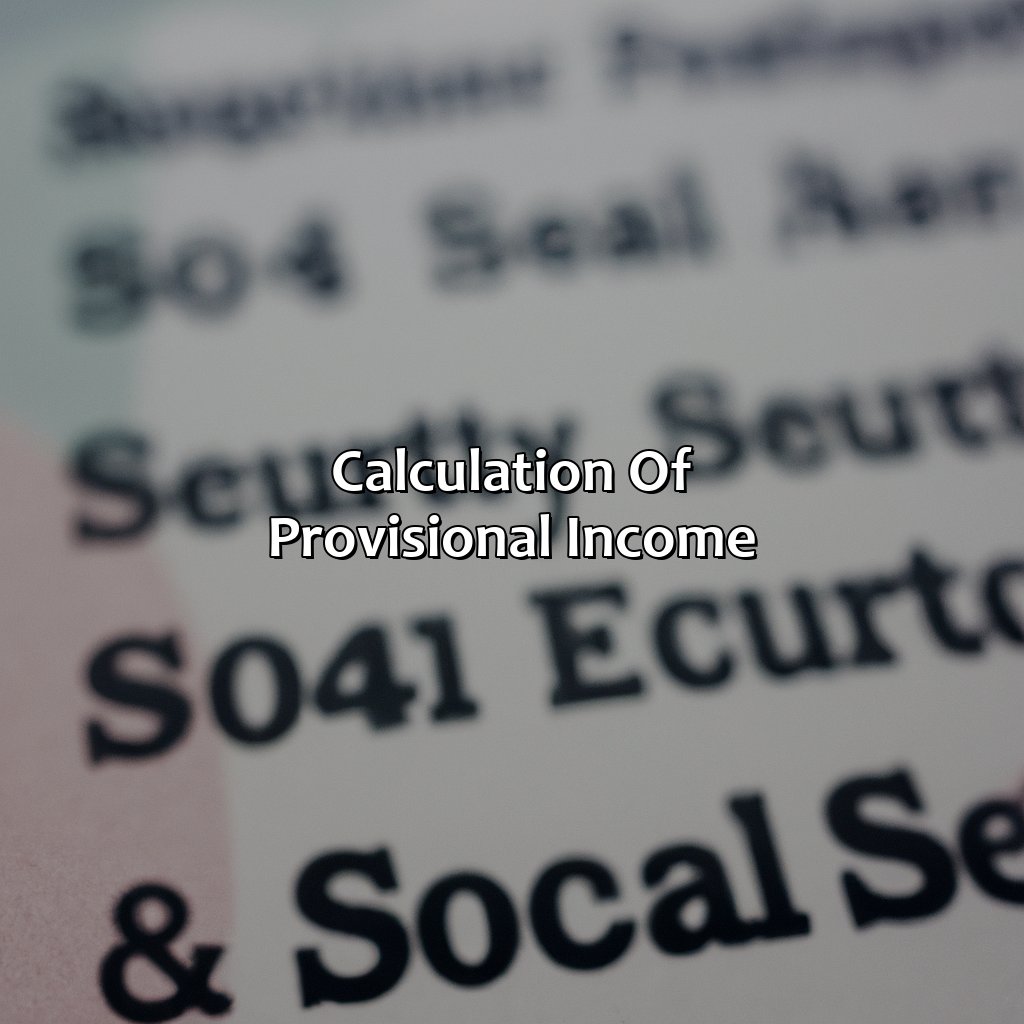
Image credits: retiregenz.com by James Arnold
Impact of Provisional Income on Social Security Taxation
Provisional income has an impact on the taxation of Social Security benefits. The calculation of provisional income includes all your sources of income, including tax-free interest and 50% of your Social Security benefits. Based on your provisional income, a portion of your Social Security benefits may be subject to federal income tax. It is important to understand how Social Security benefits are taxed to plan your retirement income effectively.
To determine the impact of provisional income on Social Security taxation, the key factor is your modified adjusted gross income (MAGI). If your MAGI is below a certain threshold, your Social Security benefits are not taxed. On the other hand, if your MAGI is above the threshold, up to 85% of your Social Security benefits may be taxed.
It is worth noting that even a small increase in your provisional income can have a significant impact on the taxation of your Social Security benefits. This is why it is crucial to consider the sources of your income and how they can impact your provisional income.
To avoid surprises when you start receiving Social Security benefits, it is recommended to plan your retirement income with a tax professional and consider diversifying your income sources. This can help you minimize your provisional income and maximize the amount of your Social Security benefits that you can keep. Don’t miss out on the opportunity to plan your retirement income effectively and reduce the impact of provisional income on your Social Security taxation.
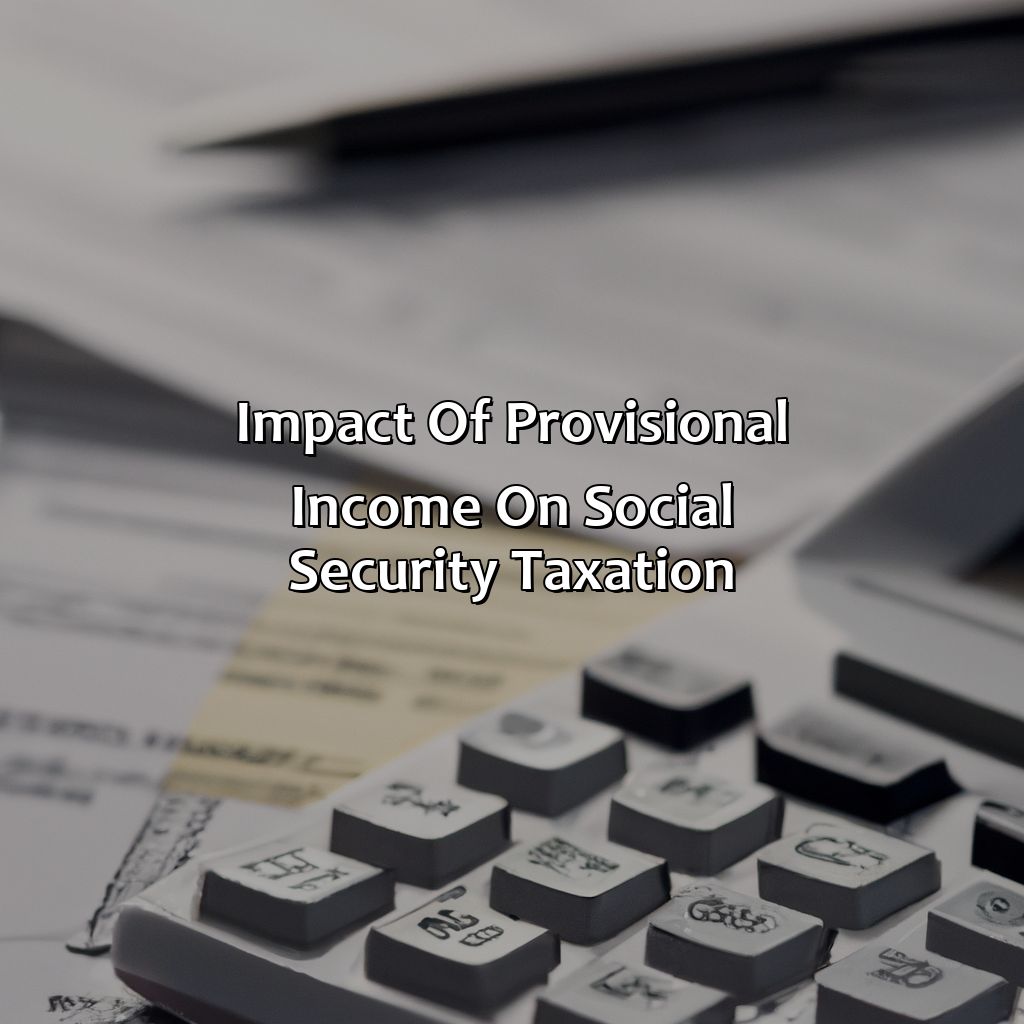
Image credits: retiregenz.com by Harry Washington
Strategies to Manage Provisional Income for Social Security Tax Purposes
Managing Provisional Income for Social Security Tax Purposes
To avoid paying higher taxes on social security benefits, try to manage your provisional income. Ways to do this include timing when you take money from taxable retirement accounts; utilizing tax-free sources of income; and using charitable donations as a tax strategy.
In addition, converting traditional IRA funds into a Roth IRA can help reduce provisional income in the future. The key is to limit your provisional income without sacrificing your lifestyle or retirement goals.
Moreover, tax software can help you calculate your provisional income and determine the best strategies to minimize it. Take advantage of all available deductions and credits to keep your income below the thresholds for higher taxes on social security benefits.
A friend of mine was surprised to learn that withdrawals from her traditional IRA and 401(k) counted as provisional income. She started using tax-free sources of income and charitable donations to manage her provisional income and reduce her tax burden. These strategies allowed her to maximize her social security benefits while minimizing her taxes.

Image credits: retiregenz.com by James Jones
Advantages and Disadvantages of Provisional Income for Social Security Tax Purposes
In this article, we will delve into the benefits and drawbacks of Provisional Income for Social Security Tax Purposes.
Advantages and Disadvantages of Provisional Income for Social Security Tax Purposes:
- Advantage 1: Provides incentive to delay retirement and keep earning to reduce future taxes
- Advantage 2: Helps in determining the taxable portion of Social Security benefits
- Advantage 3: Balances the Social Security system by taxing higher earners adequately
- Disadvantage 1: Not adjusted for inflation, may push taxpayers into higher tax brackets over time
- Disadvantage 2: Can lead to unexpected tax bills if taxpayers fail to plan ahead
It is important to note that while Provisional Income is a helpful tool in determining taxation on Social Security benefits, it should not be the sole factor in retirement planning.
In addition, taxpayers should always seek professional advice regarding their personal financial situations before making any major decisions related to retirement and taxation.
Make sure to stay informed about the latest tax laws and regulations to avoid missing out on potential opportunities or facing penalties.
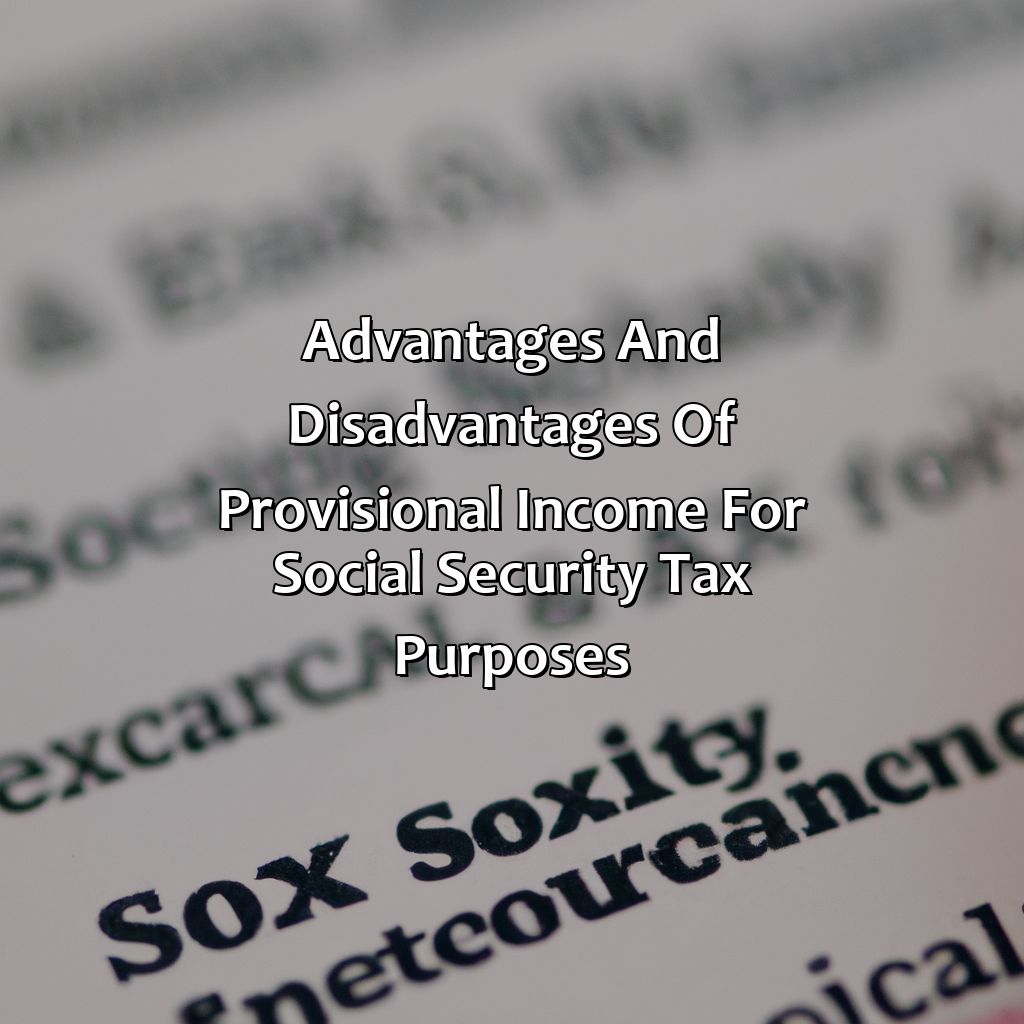
Image credits: retiregenz.com by David Arnold
Differences between Provisional Income and Modified Adjusted Gross Income
Provisional Income and Modified Adjusted Gross Income are both important calculations used for determining Social Security tax purposes. The primary difference is that Provisional Income includes certain types of income not included in MAGI, such as tax-exempt interest and a portion of Social Security benefits.
| Provisional Income | Modified Adjusted Gross Income | |
|---|---|---|
| 1 | Includes tax-exempt interest and a portion of Social Security benefits | Excludes tax-exempt interest and Social Security benefits |
| 2 | Used to determine if Social Security benefits are taxable | Used to calculate Medicare premiums |
| 3 | Calculated using adjusted gross income, tax-exempt interest, and other exclusions | Calculated using adjusted gross income with certain modifications |
It is important to note that changes in income and tax status can impact these calculations and may result in changes to Social Security benefits or Medicare premiums.
Understanding the differences between these two types of income calculations can be complicated. One recent retiree shared their experience of being surprised by the impact that their tax-exempt interest had on their Provisional Income calculation, leading to unexpected taxes owed on their Social Security benefits. It is crucial to stay informed and work with a financial advisor to make the most of your retirement income.
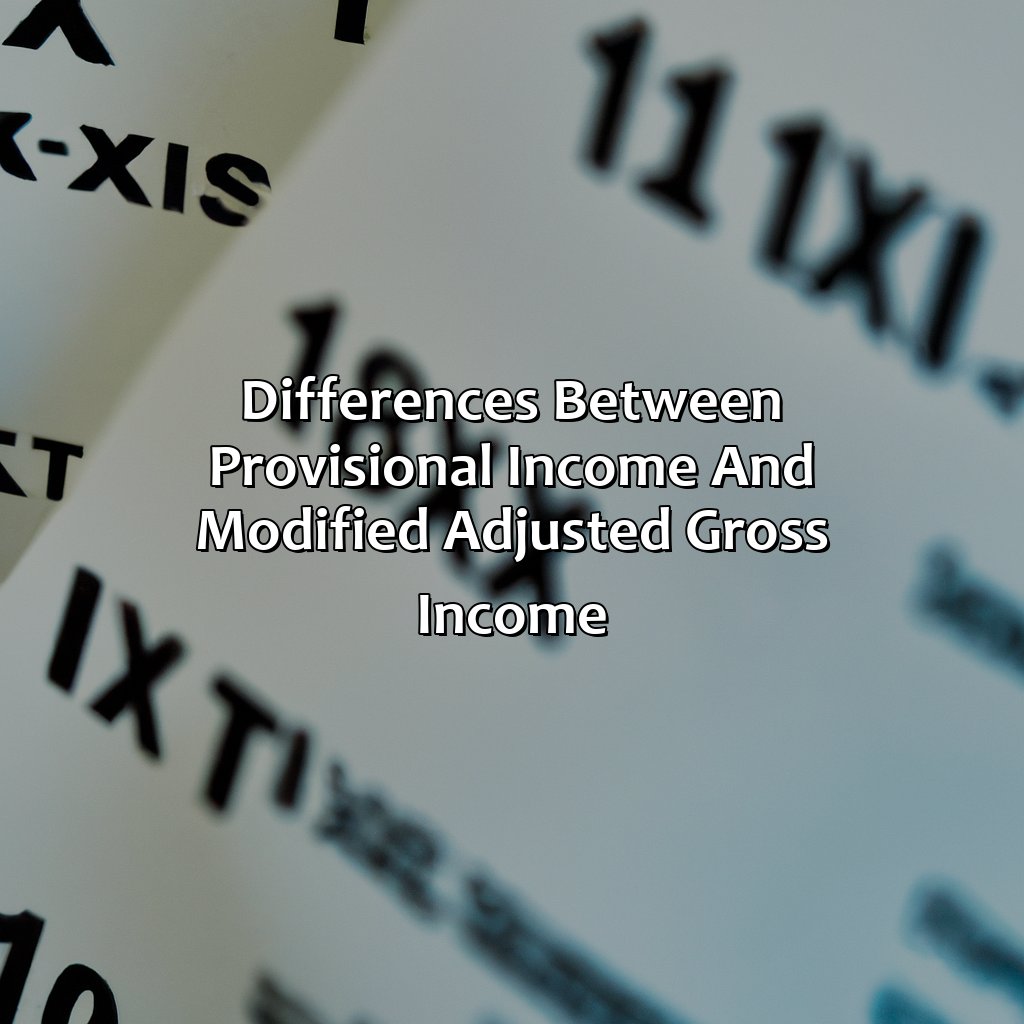
Image credits: retiregenz.com by Harry Arnold
Five Facts About Provisional Income for Social Security Tax Purposes:
Provisional income is the total income of an individual that is used to determine the taxable portion of their Social Security benefits. (Source: IRS)
Provisional income includes a combination of taxable and tax-exempt income, such as wages, pensions, and interest income. (Source: The Motley Fool)
If an individual’s provisional income exceeds a certain threshold, up to 85% of their Social Security benefits may be subject to taxes. (Source: AARP)
The threshold for single filers is $25,000 and for joint filers is $32,000. (Source: Investopedia)
There are strategies, such as delaying receiving Social Security benefits, that can help reduce provisional income and lower tax liability. (Source: Kiplinger)
FAQs about What Is Provisional Income For Social Security Tax Purposes?
What is provisional income for social security tax purposes?
Provisional income is a measure used by the Social Security Administration (SSA) to determine whether certain taxpayers should pay taxes on their Social Security benefits. It is calculated by taking your adjusted gross income (AGI) and adding any tax-exempt interest and 50% of your Social Security benefits.
Who is affected by provisional income for social security tax purposes?
Provisional income affects taxpayers who receive Social Security benefits and whose AGI, tax-exempt interest, and one-half of their Social Security benefits exceed certain income thresholds. These taxpayers may be required to pay taxes on a portion of their Social Security benefits.
How is provisional income calculated for married couples filing separately?
For married couples filing separately, provisional income is calculated based only on the income and benefits of the individual. The SSA does not consider the income or benefits of the spouse when calculating provisional income for tax purposes.
What is the income threshold for provisional income?
The income threshold for determining whether a taxpayer’s Social Security benefits are subject to taxation is $25,000 for individuals and $32,000 for married couples filing jointly. Above these income levels, a portion of Social Security benefits may be subject to income tax.
How much of my Social Security benefits will be taxed if I exceed the income threshold?
If your provisional income exceeds the income threshold, up to 85% of your Social Security benefits may be subject to income tax. The actual percentage that is taxed will depend on the amount of your provisional income above the threshold.
Is there a way to reduce provisional income for social security tax purposes?
There are several ways to reduce your provisional income, such as contributing to a tax-deferred retirement account like a 401(k) or traditional IRA, delaying receipt of Social Security benefits, or investing in tax-free municipal bonds. These strategies can help lower your AGI and tax-exempt interest, thereby reducing your provisional income for tax purposes.
 Checkout this IRS Loophole
Checkout this IRS Loophole 
